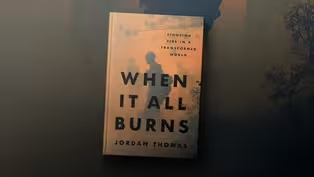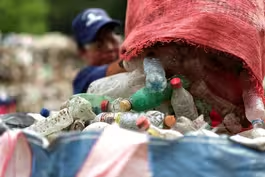
Scientists make rhino horns radioactive to fight poachers
Clip: 8/9/2025 | 2m 9sVideo has Closed Captions
How radioactive rhino horns could help save the species from poachers
The black market trade in rhino horns is driving the species to near extinction. Now, scientists at a rhino orphanage in the Bushveld of South Africa are trying to protect them from poaching in a rather surprising way. John Yang reports.
Problems playing video? | Closed Captioning Feedback
Problems playing video? | Closed Captioning Feedback
Major corporate funding for the PBS News Hour is provided by BDO, BNSF, Consumer Cellular, American Cruise Lines, and Raymond James. Funding for the PBS NewsHour Weekend is provided by...

Scientists make rhino horns radioactive to fight poachers
Clip: 8/9/2025 | 2m 9sVideo has Closed Captions
The black market trade in rhino horns is driving the species to near extinction. Now, scientists at a rhino orphanage in the Bushveld of South Africa are trying to protect them from poaching in a rather surprising way. John Yang reports.
Problems playing video? | Closed Captioning Feedback
How to Watch PBS News Hour
PBS News Hour is available to stream on pbs.org and the free PBS App, available on iPhone, Apple TV, Android TV, Android smartphones, Amazon Fire TV, Amazon Fire Tablet, Roku, Samsung Smart TV, and Vizio.
Providing Support for PBS.org
Learn Moreabout PBS online sponsorshipJOHN YANG: Finally tonight, the black market trade in rhino horns is driving these species to near extinction.
Now scientists at a rhino orphanage in the Bushveld of South Africa are trying to protect them from poaching in a rather surprising way.
JOHN YANG (voice-over): The first step is to carefully sedate beasts that can weigh up to two and a half tons.
Then the scientists get to work with a drill.
They insert radioactive isotopes into the rhino's horns in amounts too small to affect their health.
It's called the Rhizotope Project.
James Larkin of the University of Witwatersrand set it up in 2021.
JAMES LAKRIN, University of Witwatersrand: By making the horns radioactive, we are making those horns, devaluing those horns.
In the eyes of the poacher and the end users, no one wants a radioactive horn.
JOHN YANG (voice-over): South Africa has the world's largest population of rhinos, and hundreds of them are poached every year.
It's a major threat to the critically endangered rhinos driven by the lucrative black market for their horns, which are popular in some Asian countries, in traditional medicine and as status symbols.
The goal of the Rhizotope project is to make horns virtually impossible to traffic.
ARRIE VAN DEVENTER, The Rhino Orphanage: All these rhinos are here because they were orphaned, because their mothers were shot.
They were poached because of the value of the rhino horn.
Now with the Rhizotope Project, you can't take that horn anywhere.
It is radioactive.
You can't take it through any airport, any harbor, any customs office.
Sirens go off.
It is wonderful.
I'm telling you, this could be the holy grail to save this species.
JOHN YANG (voice-over): The effort is supported by the International Atomic Energy Agency.
A pilot study involving 20 rhinos proved that it's safe and effective.
Now scientists are working to expand to a broader scale and see if the idea can be applied to other species prized by poachers.
New book recounts megafire season with Los Padres Hotshots
Video has Closed Captions
Clip: 8/9/2025 | 5m 33s | ‘When It All Burns’ recounts a historic megafire season with the elite Los Padres Hotshots (5m 33s)
News Wrap: Zelenskyy says Ukraine won’t cede land to Russia
Video has Closed Captions
Clip: 8/9/2025 | 2m 37s | News Wrap: Zelenskyy says Ukraine won’t give up territory to end war with Russia (2m 37s)
Study highlights ‘grave’ health dangers of plastic pollution
Video has Closed Captions
Clip: 8/9/2025 | 4m 48s | New study highlights ‘grave, growing’ danger of plastic pollution to world’s health (4m 48s)
What Pawol’s MLB debut means for the future of women umpires
Video has Closed Captions
Clip: 8/9/2025 | 5m 31s | What Jen Pawol’s debut means for the future of women umpires in Major League Baseball (5m 31s)
Providing Support for PBS.org
Learn Moreabout PBS online sponsorshipSupport for PBS provided by:
Major corporate funding for the PBS News Hour is provided by BDO, BNSF, Consumer Cellular, American Cruise Lines, and Raymond James. Funding for the PBS NewsHour Weekend is provided by...















